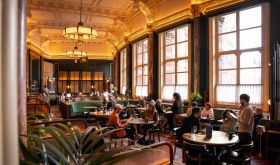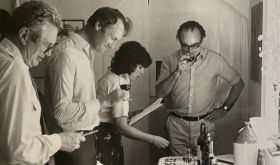Every Monday morning a courier calls at over 20 of London’s most successful restaurants, a list which includes The Square, Zuma, Cipriani, One Lombard Street and Roka.
But rather than delivering a perishable, high value foodstuff this is a actually a takeaway, albeit of a bulging bag which contains that particular restaurant’s financial performance – its sales, purchases, wage costs, credit card transactions and banking – for the previous week.
The courier waits precisely two minutes at each restaurant – if it is not ready the restaurateur has to courier it at his expense later that day – and that afternoon delivers them all to a former Barclay’s Bank in Sydenham, Kent. There they are pored over and analysed by Aku Patel and his two brothers, two of their wives, two uncles and the other 25 staff of Paperchase Accountancy who look after the financial well being of a total of 28 restaurants with another two due to open in November.
Patel, 52, is a softly spoken Indian of Kenyan origin, whose role has evolved considerably since he started the business in 1989. “I like to be associated with those chefs who make customers happy, “ he explained over a bowl of garlic soup followed by a feuilletté of wild mushrooms at his oldest client Chez Bruce in Wandsworth. “My mother was a wonderful cook and my parents ran a café and outside catering business in Nairobi in which I and my brothers worked as children. But I am a vegetarian so I am a very discerning customer. Any chef who can please a vegetarian has to be good,” he added with a smile.
Patel’s arrival in the UK coincided with the emergence of a new, more professional class of restaurateur keen for the management information Patel had imbibed working for Deloitte’s and then produced for Plessey. “I knew we had to specialise to survive so we started with a computer that cost £2,200 in the lounge of our home. Then we converted another room into an office before we had to move to the bank.”
The essence of Patel’s management information comes back to the restaurants by email in two closely printed sheets. The first, which usually arrives in the chef’s office on the Thursday morning, details all their sales and purchases by 15 different categories and informs them as to whether they have hit the magical 68% gross profit figure which fine dining restaurants need to survive. This is a remarkably detailed sheet because Patel demands that the kitchens do a weekly food sock take, particularly of the dry goods area which with its stash of truffles, chocolate and vanilla can be valuable.
“It’s crucial we get these back to the chefs by Thursday morning at the latest because if they are out of line the menus can be readjusted immediately. What used to happen in the past is that a lot of chefs only got their food cost towards the end of the month and then if it was not right they would load their next menu with extremely profitable pasta and chicken dishes. With this system there is no scope for such manipulation.”
The second, even more closely typed sheet is with the restaurateurs by Friday and this provides them not just with a weekly profit and loss account but also an extremely detailed analysis of why their restaurant is or is not performing as well as it should. “The first thing I tell my clients is that restaurants are a 52 week business. Something affects them nearly every week whether it’s a holiday or strikes or Euro 2004 which certainly wasn’t good for restaurants until England lost.”
As well as overall margins, this particular paper reflects how customers tend to behave. At lunch, for example, the norm is for bills to be split 70/30 food and drink but this ratio should change to 60/40 in the evening. “People can only eat so much so that if wine sales are up people are having a good time and the sommeliers and barmen are doing their job properly. And if customers are using their American Express cards more freely then the average spend is invariably higher because the customers are entertaining on business rather than spending their own money.”
Such an approach has not surprisingly led to confrontations. “I was very unhappy with one restaurateur because his gross profits were just too high but eventually I managed to convince him and the chef to step up the quality of what they were buying and they are still in business. And once when I just couldn’t make sense of a particular kitchen’s figures I went and sat outside in my car at 6am rather like a private detective until I saw that one driver was signing his own delivery notes and the kitchen was neither weighing nor properly checking what it was being charged for.”
The need to instil such vital financial discipline is in line with the more competitive market, Patel maintains. “When I started, restaurants would prosper if their food was good enough. Now the location, the quality of the food, the wine list and the service have to be right and so too does the ambience. If one of these is missing the restaurant will struggle. And this is happening against a background of rapidly rising wage costs due to a shortage of well trained staff. Ten years ago I used to scream at my clients if their wage cost rose above 25%. Now I am happy if they can keep it within the range of 28-30%.”
As a result, Patel believes that he will next have to look at how restaurants can improve the efficiency and productivity of their waiting staff, a significant move from mere bookkeeping. But this association has already taken Patel into unexpected avenues. The most obvious is his financial templates for new restaurants, where he has already advised the Pourcel brothers, who run the three star Jardin des Sens in Montpellier, and are due to open in Waterloo Place, SW1, in November, while the second involves the relocation of Thyme restaurant to within The Hospital entertainment complex in Covent Garden at about the same time. The second is the role of ‘agony aunt’ as restaurateurs try to take advantage of Patel’s experience and good nature by asking him whether he happens to know of any key members of staff who may be looking to move on.
But inside this genial exterior is a man who realises that he does not have to be a chef or even understand the French words on a menu to understand a restaurant. “All I want is the numbers, “he confessed. But along the way Patel has learnt to judge chefs by whether they have a rough idea on the cost of such basic ingredients as milk and butter, the kind of cook books they buy for the kitchen and where they go on holiday because food styles are changing so quickly that chefs must keep continually aware of what is going on.
“Nor do I fear restaurateurs, either,” he added. “I won’t let them have company cars or corporate credit cards. My job is to bring them down to earth.”













